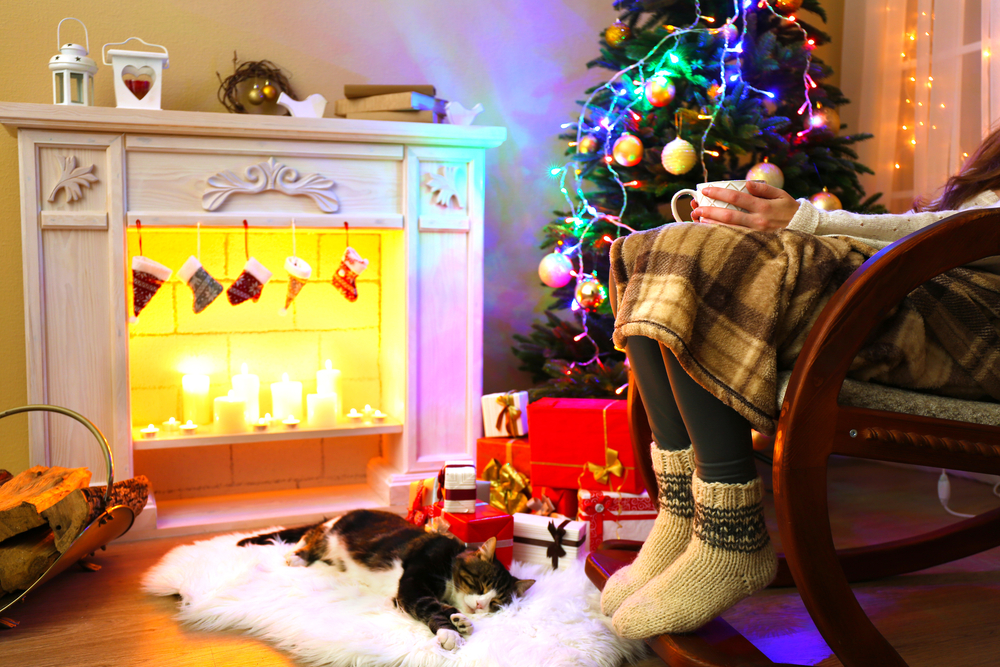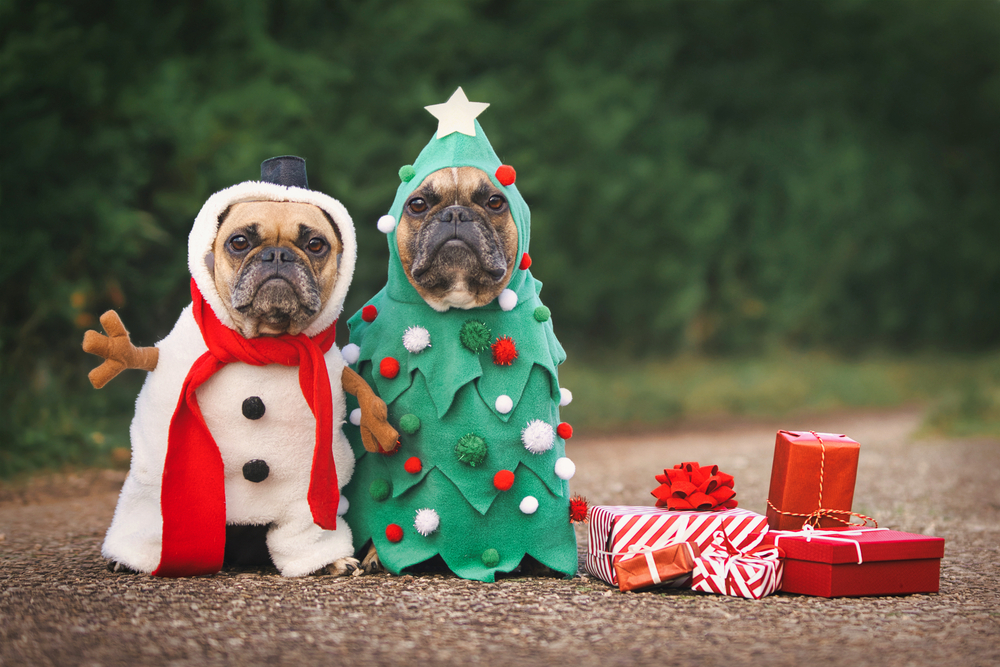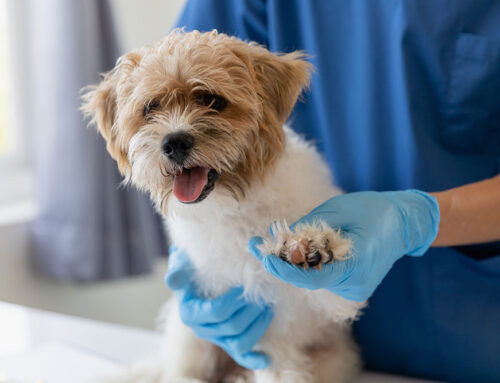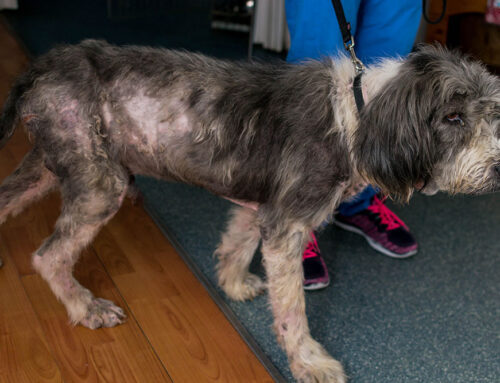As the end of the year approaches, you’re gearing up for the holidays. Your home is decked out in an array of twinkly lights, tantalizing aromas fill your kitchen, and brightly wrapped gifts are begging to be ripped open. Your pet is also begging, whether for a ham bone or for the tasty treats they can smell through the wrapping paper.
However, many holiday traditions, especially the ham bone, can cause your furry pal serious harm. To help prevent your pet from having a veterinary emergency, read our Bayview Animal Hospital team’s description of common pet holiday hazards, and ensure you follow our recommended safety measures. This year, help your four-legged friend enjoy a safe and merry festive season.
Holiday Hazard #1. Tempting pet treats: Naughty or nice?
When sharing the bounties of your holiday feast with your pet, determine if each tidbit is naughty or nice. Do not give your furry pal these common foods that make the naughty list:
- Ham — Ham makes for a delicious main dish, but this meat’s high sodium content and sugary glaze can seriously upset your pet’s stomach and pancreas, causing vomiting, diarrhea, and pancreatitis, a potentially life-threatening illness.
- Meat bones — Save the ham bone for soup and toss turkey bones in the trash, ensuring your pet can’t get them out. Crunching or swallowing a bone can damage your pet’s teeth, pierce their gastrointestinal (GI) tract, or create a blockage that requires emergency surgical removal.
- Casseroles and sides — Many casseroles and side dishes are comfort foods that are loaded with dangerous ingredients for pets. Dairy products are high in fat and can cause digestive problems, because many cats and dogs are lactose intolerant. Garlic, onions, and chives can enrich your side dishes’ flavor, but if your pet eats these vegetables, they can develop anemia.
- Nuts — While macadamia nuts are toxic to dogs, all nuts are high in fat and also pose a choking or obstruction hazard.
- Desserts — Pumpkin pie, chocolate cake, or sugar-free cookies should not be shared with your pet. Spices, chocolate, xylitol, sugar, and fat are all unhealthy for your dog and cat, and can be downright dangerous.
- Alcohol — Keep alcohol out of your pet’s reach, and do not allow them to help clean up a spilled cocktail. In addition, ensure you tell guests they should not share their alcoholic beverage with your cat or dog. Pets are much more susceptible to alcohol and can succumb to poisoning after ingesting even a small amount.
If you would like to give your pet a plate they can enjoy while everyone feasts, you can do so safely by tweaking the ingredients. Holiday morsels that end up on your pet’s nice list include:
- Boneless, skinless turkey breast that has no seasonings
- Plain mashed or roasted sweet potatoes
- Fresh green beans
- Plain canned pumpkin
Holiday Hazard #2. Trim the tinsel: Decoration dangers for pets
Tinsel, garland, and other string-like holiday decorations are extremely dangerous to cats, as they like to play with and sometimes ingest these items. When a string passes through your cat’s digestive tract, it can become stuck and bunch up their intestines, causing a linear foreign body. As peristalsis (i.e., GI contents’ onward movement) continues, the string can lacerate the intestinal walls and cause sepsis. Rather than trimming your Christmas tree with tinsel, do not use this string-like decoration. In addition, keep all ribbon-like strings away from your pet, as linear foreign bodies can also occur in dogs. After opening gifts, toss all ribbons into a securely latched trash can to help ensure your pet cannot ingest it
Holiday Hazard #3. Oh Christmas tree, don’t fall on me: Secure your spruce
Having a live or artificial Christmas tree indoors is exceptionally intriguing to your curious pet. A poorly secured tree can topple as your pet sniffs around or climbs the branches. Protect your pet and your tree by blocking your furry pal’s access or by securing your tree to the ceiling or wall.
When decorating your Christmas tree, avoid using metal ornament hooks, fragile ornaments, and salt dough ornaments. These items can cause injury or toxicity in your furry pal, so opt for soft, unbreakable ornaments.
If you have a live Christmas tree, keep your pet away from the water in the tree stand. Over time, this chemical-laden water will become stagnant, and can harm your pet via the fertilizers, bacteria, and mold that grows within.
Holiday Hazard #4. Peace on Earth: Minimizing your pet’s stress

Not all pets are party animals, so an over-the-top holiday celebration can make them anxious and afraid. Give your pet some peace during the party by providing them with a quiet room that is off-limits to guests. Make your pet’s retreat cozy by giving them a plush bed, warm blanket, and favorite treat and toy. Play classical tunes at a low volume or leave a TV or radio on to help muffle the party hubbub.
If your pet chooses to be a party guest, instruct two-legged partygoers to let your furry pal make the first move. People should allow your pet to initiate all interactions, and allow your furry pal to walk away when they choose. Guests should not restrain your pet to lavish attention on them, as doing so makes most pets uncomfortable.
Holiday hazards can ruin your festive celebrations, so take the time to pet-proof decorations and educate your guests on paw-ty pet-iquette. If your furry pal still runs into trouble despite your best pet-safety holiday efforts, call our Bayview Animal Hospital team.







Leave A Comment